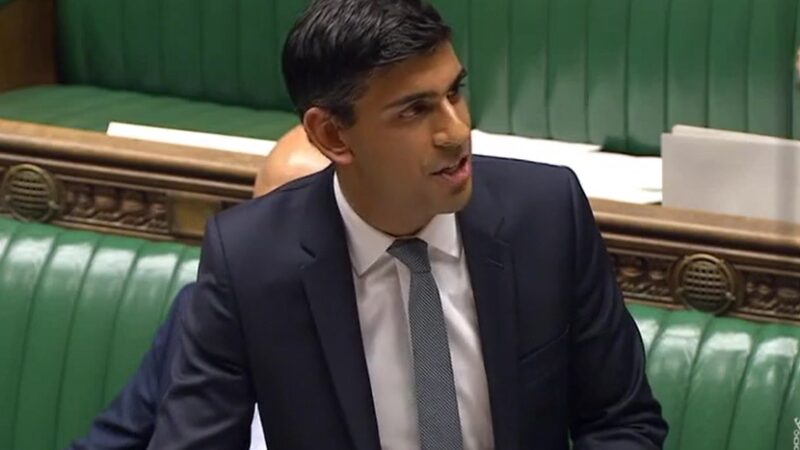Rishi Sunak had a chance to tackle the climate crisis. He blew it.

Last year, we witnessed the bizarre situation of carbon emissions from cars actually rising, as people bought fashionable bigger vehicles that consume more fuel.
Any technological fix can’t solve the climate emergency when the government is building bigger roads and encouraging driving by making it relatively cheaper each year to journey by car, compared to jumping on a train, or a bus.
The Fuel Duty Escalator would be raising an extra £9bn a year if it hadn’t been capped in 2000 and frozen in 2011. Train and bus fares would be a lot lower, services a lot better and the amount of traffic on our roads would have been declining for the last twenty years.
Instead, there was talk of an estimated 90 Conservative MPs willing to rebel if the government put fuel duty up. Despite the need for huge investment, it looks like the Chancellor caved to these demands. I find it staggering that a Parliament that last year declared a climate emergency would now reject the common sense of a gradual increase in fuel duty at a time when world oil prices have just nose-dived by 20%.
Yet, that is the reality of our political class. They mouth the words about carbon reduction and may vote for some genuinely positive changes to be made in today’s budget, but they won’t face up to the fact that a lot of what we do is making things worse.
We spend billions subsidising fossil fuels. From tax free aviation fuel to grants for oil and gas exploration. Even our foreign aid which is meant to support carbon reduction morphs into money for gas projects when you examine the small print.
A majority of both Conservative and Labour MPs have supported Heathrow expansion and the growth of regional airports, despite no guarantee that aviation will reduce its carbon emissions. The recent court case may have brought Heathrow expansion to a temporary halt, but last year, when a court ordered a climate ban on a gas fired power station, the government simply over-ruled them. All of these projects require the taxpayer to pay billions towards the transport links that get people to them.
The government is stupidly proud of its commitment to spending £29bn on new roads, in spite of the fact that we are decades away from electric vehicles being the norm. And even when we install new electric charging points there is no rule that they should operate only on renewables, which means that electric vehicles are far less of a solution than we would hope. A simple requirement on public subsidy for charging points could solve this.
In addition, we have reached the tipping point of burning more than we recycle, yet we continue to build incinerators and to allow councils to sign up to decades-long contracts, with the expectation that we will still be operating them in 2050 when we are meant to meet our zero carbon target. We should tax incinerators and tip the scales back towards recycling.
Despite the moratorium on fracking, our planning system still allows coal mining and the use of acidification to extract fuels. We are still building homes that are not zero carbon and allowing thousands of new houses on flood plains. We must change the planning rules and save the exchequer millions of pounds on flood defences.
The more we build things that make the climate worse, the more it will cost taxpayers in future budgets to unbuild the mistakes and retro-fit solutions.
The coronavirus is currently emptying the skies of passengers and encouraging tens of thousands to work remotely. We are changing habits rapidly because we must. So why can’t government and businesses do the same in response to global warming?
A lot of people have already acted individually in response to climate change by eating less meat, rejecting single use plastic and making other small changes to their lives. They recognise that this climate emergency is growing and will remain with us for a very long time.
I had hoped the government uses this Budget as the launch of a new Green Deal that ultimately makes it easier for people to live, work and prosper in a way that doesn’t threaten our existence. Alas not.
Baroness Jenny Jones is a Green Party peer.
Left Foot Forward doesn't have the backing of big business or billionaires. We rely on the kind and generous support of ordinary people like you.
You can support hard-hitting journalism that holds the right to account, provides a forum for debate among progressives, and covers the stories the rest of the media ignore. Donate today.




3 Responses to “Budget: How the government is making the climate emergency worse”
Budget: It's good we're finally spending more but it's not enough and in the wrong areas | Left Foot Forward
[…] it sits uneasily with the government’s claims of reducing carbon emissions. A broader national infrastructure […]
Budget: It’s good we’re finally spending more but it’s not enough and in the wrong areas – LeftInsider
[…] it sits uneasily with the government’s claims of reducing carbon emissions. A broader national infrastructure […]
Budget: a winner? Not for the environment or those on low incomes | Political Concern
[…] points out that this omission sits uneasily with the government’s claims of reducing carbon emissions. A broader national infrastructure […]